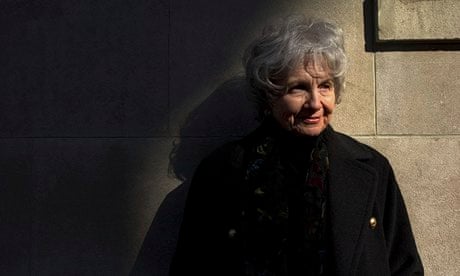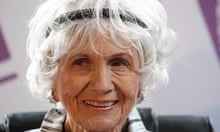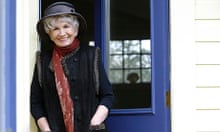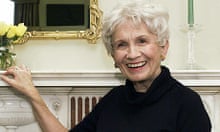Modesty, that rare virtue, has this year alighted upon the Nobel prizes.
Physicist Peter Higgs evaporated into a Highland walking tour to evade media attention, then Alice Munro, the 82-year-old doyenne of the short story, outdid him – by being simply unaware that there was a certain literature prize in the offing.
"Mom, you won," said one of her daughters, waking her up with the news.
"I was kind of dazed about what I had won," Munro told the Canadian broadcaster CBC in a brief and rare interview. "I had no idea of it. I don't think I knew I was even on a list until maybe yesterday."
Munro is the second Canadian-born writer to win be awarded the Nobel prize for literature – after Saul Bellow – and the 13th woman. "Can this be possible?" she asked. "Really? It seems dreadful there's only 13 of us."
With her acceptance of the 8m Swedish krona (£775,000) prize she joins a rollcall of 110 past winners including Thomas Mann, Harold Pinter, Toni Morrison, Doris Lessing, Albert Camus and Ernest Hemingway.
Frequently compared to Chekhov and Mansfield for the deft originality of her short stories, she had always been among the favourites to win, alongside novelist Haruki Murakami and Belarusian investigative journalist Svetlana Alexievich.
It is a victory that has delighted many of her literary colleagues as well as her devoted readership – to whom she has always seemed something of a cherished secret. That she has been frequently omitted from conventional lists of the greatest writers of her age is perhaps because of her chosen form, the short story, as well as the apparent narrowness of her palette, since most of her works explore the warp and weft of smalltown life in Western Ontario.
"This is the Nobel announcement that has made me happiest in the whole of my life," said novelist AS Byatt, "She has done more for the possibilities and the form of the short story than any other writer I know."
Fans praise her ability to express, in brutally honed sentences, not just the nature of small human hardships and dilemmas, but the very feeling of living within them.
Novelist Anne Enright said: "[Her characters] are like you, actually - or a heightened, more perceptive version of you - the way they think about life and realise things late and carry on."
The writer and poet Colm Toíbin described one of her stories as "tough, tough, but yet written using sentences of the most ordinary kind, and constructed with slow Chekhovian care".
Munro was born Alice Laidlaw on 10 July, 1931, near Wingham, Ontario, and through her father, who was a farmer of silver foxes, traces her ancestry back to James Hogg, author of Confessions of a Justified Sinner.
As a child "books seem to me to be magic, and I wanted to be part of the magic," she once told the Guardian.
Her first story was published when she was a student at the University of Western Ontario. More followed, and even a book approaching a novel, a Bildungsroman called Lives of Girls and Women (1971). It contains a passage marking out the territory of her artistic vision: "what I wanted was every last thing, every layer of speech and thought, stroke of light on bark or walls, every smell, pothole, pain, crack, delusion, held still and held together - radiant, everlasting."
Her fiction has been published in 17 volumes, including The Love of a Good Woman (1998) The View From Castle Rock (2006) and, most recently, Dear Life (2012) – which she claimed was her valedictory work.
Admiration for Munro is not quite universal. Christian Lorentzen, senior editor at the London Review of Books, recently battered Dear Life. "Reading 10 of her collections in a row has induced in me not a glow of admiration but a state of mental torpor," he wrote.
He dislikes her repetitiousness of material, he told the Guardian: "Minor adulteries committed or contemplated; sibling rivalries; occasionally sibling rivalries and minor adulteries mixed; the slow march of dementia or cancer". She was, he said slightingly, popular among "readers of the New Yorker wondering what it was like living out in the sticks." However, even Lorentzen was happy Munro had won: he took £400 at the bookie's.








Comments (…)
Sign in or create your Guardian account to join the discussion